Fake used car buyers, trick sellers into running VIN# reports to prove car is OK
Foreign scammers pose as used car buyers, trick sellers into running VIN# history reports to prove their car is good
Here at CarBuyingTips.com, we are known as one of the most knowledgeable resources on covering online fraud anywhere. For years we have investigated and reported on the rampant fraud on eBay and Craigslist. The foreign Nigerian scammers, the Russians and Jamaican organized gangs keep getting smarter with their scams, duping sellers and buyers alike from every known classified ads site.
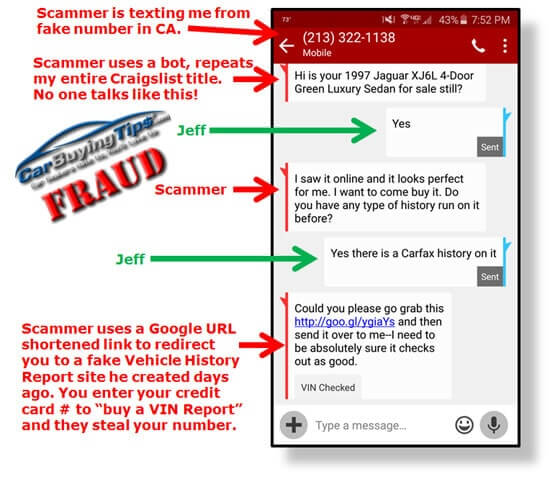
It starts with a vague initial contact from a "buyer"
I sell a lot of Cars and other items on Craigslist and eBay, and it has become a real problem when you list something of noticeable value, you attract scammers within hours of your listing going live. This proved true for me almost to a script in the last few weeks with two $800 water distillers that I listed. Within hours of listing I started getting vague initial text messages and emails from people I knew were scammers, using the same wording across numerous items I have listed.
Used car vehicle history reports scam
The scams continued the other day after I listed a friend's 1997 Jaguar XJ6L for sale on Craigslist at 11:00 AM. By 6 PM that same day I got texted by a person I immediately knew was a scammer, because I've been doing this so long, and they are so predictable. He said "Hi, is your 1997 Jaguar XJ6L 4-Door Green Luxury Sedan for sale still?" No one talks like this, and these are common methods used by Nigerian scammers.
This scammer was obviously using a bot and scraping my used car listing title off Craigslist to feed into his script for his text message. See the screenshot above of my text message thread with this Craigslist scammer.
Fake vehicle history report sites are stealing credit card numbers
You can see in the screen shot of my text message thread above, after a few text messages asking me if I ran a vehicle history report on the Jaguar, the scammer sends me a link to what I already know is a phony vehicle history report site, one that he setup just days before. He wants me to buy a VIN report on my car there to assure him my car is OK.
Anyone foolish enough to visit that non-secure site and enter their credit card number to buy the report is likely to have their credit card number stolen, and there's probably no real vehicle report produced either. Here you thought you were just selling your used car, but you really ended up getting sucked into the vortex of a phishing scam.
The scammer's link in our text message stream screenshot shown above is a Google URL shortened link, which leads to his very suspicious site called vinhistoryreporting.com, a domain name that was created on October 15, 2015, just days ago. That should be your first red flag, along with the bogus text on their home page claiming that they are better than CARFAX.
Really, a site no one ever heard of before that is merely days old is really better than CARFAX? Also the fake counter on their home page showing the millions of reports they have served increments suspiciously fast right before your eyes.
Some red flags about non-secure web sites
Many folks are unaware of the safety features of the internet and web sites and would easily be suckered in by this scammer's very professional looking web site, but look at the screen shot below of his site, and we want to point out that the scammer's web site is not secure, there is no telltale "https" at the beginning of the address, where the "s" would indicate a secure and encrypted site.
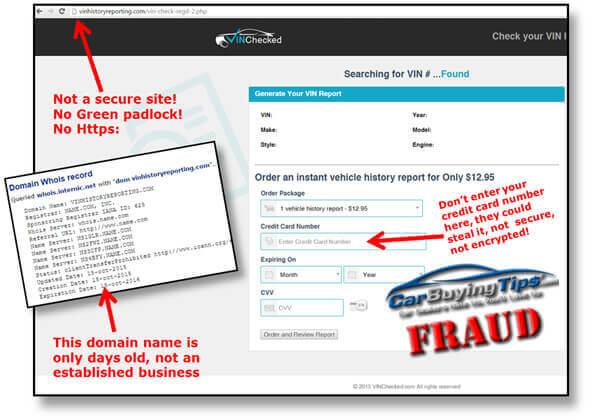
All legitimate shopping cart sites are secure and begin with https
Any shopping cart that is not secure and encrypted with https is a fraud. Any legitimate site would be secure socket layered and there would also be a padlock next to the URL address if it was a secure site. So this scammer's site shown above is not secure, and not encrypted, which should be your biggest red flag that this could be a fraud site. Scammers are too lazy to create secure web sites because it is a lot of effort to pull it off and make it secure.
The core of their scam, they lower the boom on you
Scammers don't waste time setting up legitimate merchant accounts which would require security and encryption, and leave electronic trails to their bank accounts, instead they install a simple form on their fake vehicle history report site that simply emails them your credit card number that you entered.
There you have it, the core of their scam is a simple form on a simple web site page that collects your information that you enter, and emails it to them, and so they can immediately start using your credit card. This is the vortex of this scam, this is their goal from the first text message they send you, to get you to their form to enter your credit card number. After that you'll never hear from them again, they often dump the email account they used, or the online account to generate the phony text messages they sent you.
CarBuyingTips.com is a secure site
Look at the upper left corner at your browser's address bar for our web site CarBuyingTips.com where you are reading this article right now, you'll see even our site which does not sell anything at all is a secure web site, we have the padlock icon, it is green if you are using Google Chrome, and we have the https in our address.
Trusted sites like AutoCheck, who we have used for years to run real vehicle history reports, will always have the shopping cart credit card page fully secure with the padlock. Whoever created the above mentioned Vinhistoryreporting.com site got sloppy, and as you'll see further down this article, the site was copied from an earlier iteration with a different domain name, and they forgot to change the logo from Vinchecked.com to their current name Vinhistoryreporting.com. Oops! I always catch my little puppet scammers missing these little details. I enjoy toying with them.
What a legitimate business shopping cart page should look like
See this screenshot below of the known and trusted AutoCheck.com who sells legitimate vehicle history reports, this is what you should expect from a legitimate business.
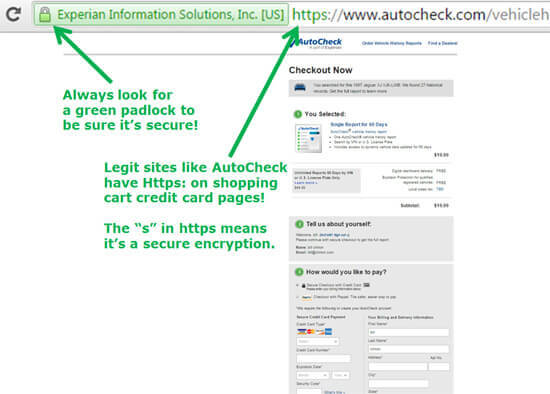
You will see in the screen shot above from AutoCheck, their site is secure, they have the padlock, and they have the https, so you know your credit card is safe. Next time you are in a shopping cart of any major web site, pay attention, and you'll see the pattern of secure sites, and you'll be able to spot a scam site a mile away.
A little common sense goes a long way on Craigslist
Now that you know what to look out for, if you just use the tiniest amount of common sense you can avoid losing your credit card info to these phishing scammers. We believe these scammers to be mostly living in Russia. The Russians prefer to run phishing scams and steal your bank and credit card account data, logins and passwords, where they can continue to steal more thousands from you, like the gift that keeps on giving.
But the Nigerians, mostly operating out of the city of Lagos, Nigeria, prefer to extract a small believable amount of money out of their Craigslist victims by using phony checks, and money orders, and getting victims to wire money through Western Union, or MoneyGram through Walmart for example.
The scammers are not always so smart
Sometimes these scammers who appear so slick actually make a of lot dumb mistakes, that many victims who were even dumber failed to see a number of red flags that could have saved them along the way. Take a look at this screenshot below of another domain name site these scammers made using the same design as the other fraud we mentioned earlier.
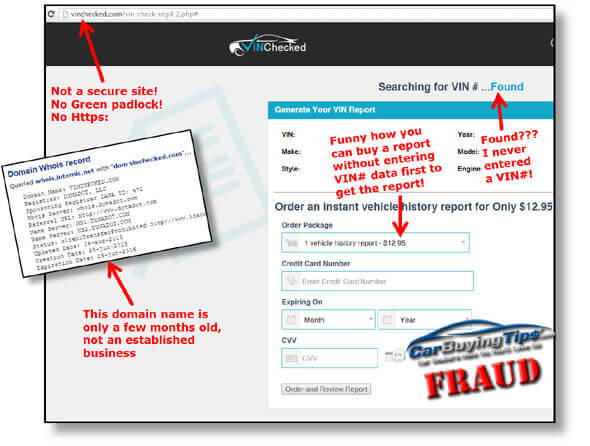
Scammers reuse web site designs; forget to change logo names
The fraudsters often reuse the code for their web sites, running them for a month or so until it all hits the fan, then their web host learns they are a fraud and shuts them down. No problem, they just bounce right back up again and create another domain name and copy all that code to the next site for a few months. You can see the first fraud site we mentioned has the same design as the screenshot above, but they forgot to change the name on the logo.
As you can see on the screenshot above from the alleged fake vehicle history report site called vinchecked.com, they got sloppy, and in addition to no https, and no padlock icon, there is no About Us page, no FAQ, no Contact Us page, no way to reach anyone, and of course no link to the Better Business Bureau report because there is no report, because there is no company. That's another red flag that should cause anyone to think twice about using a site like this.
Also the domain name of that scam site above is only a few months old, hardly an established brand, and just look how our screenshot shows you can trap them with their own tricks by not entering a VIN# on the form on their payment page, yet if you look on the screen shot above, you can see in the upper right it says "Found!" I purposely did not pre-enter any VIN and so the credit card form is blank on the page above. Funny how they let you "order" a report with your credit card even with no VIN# for them to create your report!
Who are these scammers you ask? You will never find out who they really are, they are too good at leaving a confusing trail behind them, but you can do a domain name lookup on the site as we did below:
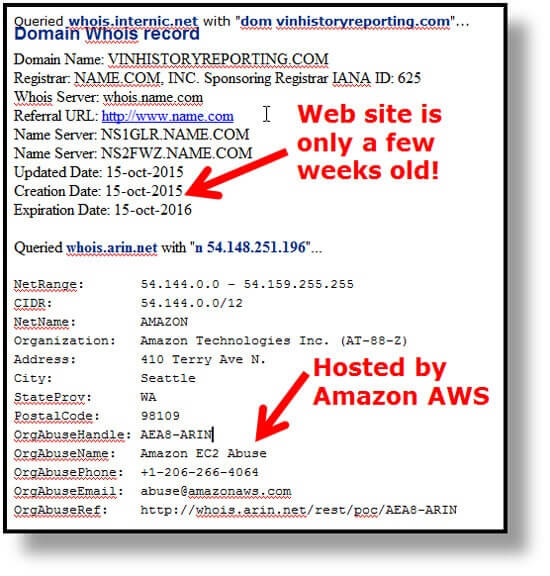
Here you can see the site was just created on October 15, just a few weeks before this article was written. The domain name lookup report shows that it is hosted by Amazon AWS. A complaint was sent to Amazon to investigate the site and shut it down if they determine the site to be a fraud. As of press time we still have not heard from Amazon about shutting it down, and the scammer's site is still up and running.
Avoiding scams on Craigslist is simple
It's very easy to avoid scams on Craigslist but too many people have their brain set on autopilot and don't pay attention. Your success is in understanding how a legitimate Craigslist trade is done. If you have your car listed, and a person claiming to be a buyer contacts you, always remember a real buyer wants to come see the car now. A scammer lies about wanting to buy it without seeing it first or never even shows up, because they are not even in this country.
Many web hosting companies are enablers for these scammer sites
Over the years we have gotten mixed results in dealing with web hosts and convincing them to shut down a fraud site they are hosting. Some web hosts prefer profit over spending a few minutes work in looking at the scam site and doing the right thing to shut them down. They like to look the other way and coldly tell you it's not their job to moderate content on a web site.
Real buyers want to buy your item; don't send you links to web sites
A real buyer doesn't ever send you any links to visit any web sites at all. If you do nothing else and just ignore any emails or text messages containing links, you'll probably save yourself from 90% of the scams out there. If they send you an email link and say contact me here on my Gmail account, don't do it. That premise is so stupid, if they were able to contact you through your listing using the Craigslist controlled email system, they can still contact you through your reply.
The minute you ever hear the words Western union or MoneyGram, you better run. Just stop communicating with them, and don't respond to any of their emails. Any time you see those Western Union words it is a fraud.
This is why Craigslist tells you to always deal locally in person with cash, and never get sucked into using anything else. They also warn you against using these cash transfer services because your money can be picked up anywhere in the world, it's not going to a moving company or a payment agent in the U.S., it's going to an organized gang in Nigeria.
They are trying to get you outside of the Craigslist communications system, where they will then begin other scams with you involving sending cashier's checks for thousands more than your asking price, they ask you send them the overage via Western Union or MoneyGram, and then their check bounces.
If someone sends you a link to get a vehicle history report and it's not a known trusted household name like AutoCheck, then you know they are trying to scam you. Just don't ever click on any links that a stranger sends you ever. If you need to log into a bank site for example, always go directly to the site to login, never click any links that claim to be taking you there.
How to tell real Craigslist buyers from the scammers
The bottom line is you want to weed out who is really a local Craigslist buyer and who is in fact a criminal. Any person guiding you in any direction other than them driving over to see your vehicle for sale is a fraud, end of story. Keep that in your mind at all times and you'll do fine.
The scammers are not local to you. They are mostly in Nigeria, Russia, London and Romania. This is why they send you links to click on instead of showing up, or they want to send you checks in the mail without even coming to see your car first.
Real buyers come to spend money; don't send you to sites to spend
Remember this important point: you are selling something online; money should be flowing to you, not away from you. A real buyer does not send you to a site to spend money; a real buyer comes to you to spend money. Know the difference, and don't ever get misdirected into anything involving you sending out money. You better catch yourself and ask "Why am I sending them money, they should be sending me money?"
It's perfectly safe to sell your car online, and if you heed all of our advice here, you'll never get taken, and you'll actually have a good time catching your little scammer puppets in the act.
Make sure you are up to date on all of the latest car buying related scams. Read our Top 10 Scams chapter.
Now it's your turn. Have you been contacted by a buyer or seller whose story gave you a bit of concern like it was a scam? Let us know below in the comments.

About The Author: Jeff Ostroff
A lifelong consumer advocate with over 20 years of unparalleled expertise, Jeff is the Founder, CEO and Editor-In-Chief of CarBuyingTips.com. As chief consumer advocate, he oversees a team of experts who cover all aspects of buying and selling new and used cars including leasing and financing.
For decades, Jeff has been the recognized authority on vehicle purchasing, sought out often by the media for his decades of experience and commentary, for live call-in business radio talk shows and is cited often by the press for his expertise in savvy car shopping methods and preventing consumer scams and online fraud. Jeff has been quoted in: CNN, MSNBC, Forbes, New York Times, Consumer Reports, Wall Street Journal and many more.
Jeff also has extensive experience and expertise in new car brokering and selling used cars for clients on eBay and Craigslist. Connect with Jeff via Email or on Twitter.







